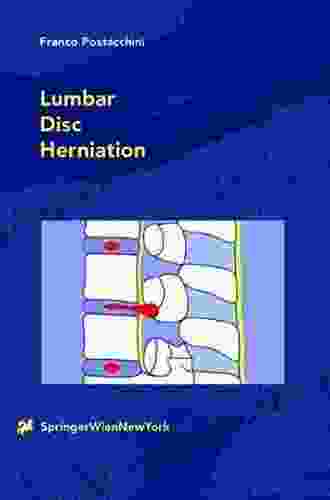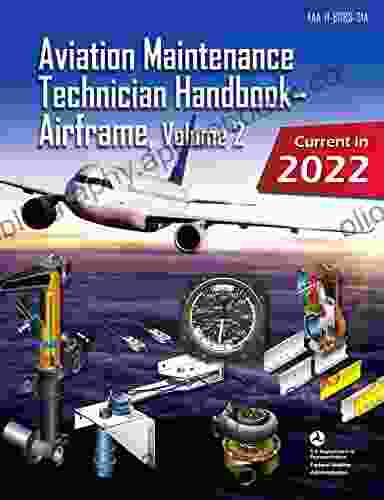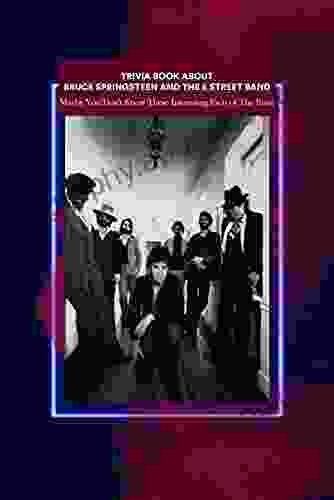Overview
Lumbar Disc Herniation: A Comprehensive Guide
A lumbar disc herniation occurs when the soft, gelatinous center of an intervertebral disc in the lower back (lumbar spine) pushes through the tough outer layer of the disc. This can put pressure on the surrounding nerves and spinal cord, causing pain, numbness, weakness, and other symptoms.
5 out of 5
| Language | : | English |
| File size | : | 71395 KB |
| Text-to-Speech | : | Enabled |
| Screen Reader | : | Supported |
| Enhanced typesetting | : | Enabled |
| Print length | : | 1587 pages |
In this article, we will delve into the causes, symptoms, diagnosis, and treatment of lumbar disc herniations, with a focus on surgical interventions. We will also explore the expertise of Dr. Franco Postacchini, a renowned spine surgeon specializing in lumbar disc herniation surgery.
Causes and Risk Factors
Causes
Lumbar disc herniations can be caused by a variety of factors, including:
- Trauma or injury to the back
- Repetitive heavy lifting or twisting motions
- Prolonged sitting or standing
- Aging
Risk Factors
Certain factors can increase your risk of developing a lumbar disc herniation, such as:
- Obesity
- Smoking
- Family history of back problems
- Certain occupations that involve heavy lifting or repetitive twisting
Symptoms
The symptoms of a lumbar disc herniation can vary depending on the location and severity of the herniation. Common symptoms include:
- Lower back pain
- Pain, numbness, or weakness in one or both legs
- Sciatica (pain that radiates down the leg along the sciatic nerve)
- Difficulty walking or standing
- Loss of bowel or bladder control (in severe cases)
Diagnosis
To diagnose a lumbar disc herniation, your doctor will perform a physical examination and review your medical history. They may also Free Download imaging tests, such as:
- X-rays
- Computed tomography (CT) scans
- Magnetic resonance imaging (MRI)
These tests can help your doctor visualize the discs in your lower back and identify any herniations.
Treatment
The treatment for a lumbar disc herniation depends on the severity of the symptoms and the location of the herniation. Nonsurgical treatments, such as physical therapy, medications, and injections, may be effective in relieving symptoms for some people.
However, in some cases, surgery may be necessary to remove the herniated disc material and relieve pressure on the nerves.
Surgical Treatment
There are several different types of surgical procedures that can be used to treat a lumbar disc herniation. The type of surgery that your doctor recommends will depend on factors such as the size and location of the herniation, your overall health, and your surgical history.
Some of the most common types of lumbar disc herniation surgeries include:
- Microdiscectomy: In this procedure, a small incision is made in the back and a microscope is used to remove the herniated disc material.
- Laminectomy: In this procedure, the lamina, which is the back part of the vertebra, is removed to create more space for the spinal cord and nerves.
- Spinal fusion: In this procedure, two or more vertebrae are fused together to stabilize the spine and prevent further disc herniations.
Dr. Franco Postacchini: A Renowned Spine Surgeon
Dr. Franco Postacchini is a highly skilled and experienced spine surgeon who specializes in lumbar disc herniation surgery. He is the Director of Spine Surgery at the University of Pittsburgh Medical Center and has performed over 10,000 spine surgeries.
Dr. Postacchini is known for his innovative surgical techniques and his commitment to providing personalized care for each patient. He uses state-of-the-art technology and the latest surgical procedures to achieve the best possible outcomes for his patients.
If you are considering lumbar disc herniation surgery, it is important to choose a surgeon who is experienced and qualified. Dr. Franco Postacchini is one of the leading spine surgeons in the world and can provide you with the highest level of care and expertise.
Lumbar disc herniation is a common condition that can cause significant pain and disability. Fortunately, there are a variety of treatment options available, including surgery. If you are experiencing symptoms of a lumbar disc herniation, it is important to see a doctor to discuss your treatment options.
If you are considering lumbar disc herniation surgery, Dr. Franco Postacchini is one of the world's leading spine surgeons. He can provide you with the highest level of care and expertise to help you achieve the best possible outcome.


























































































